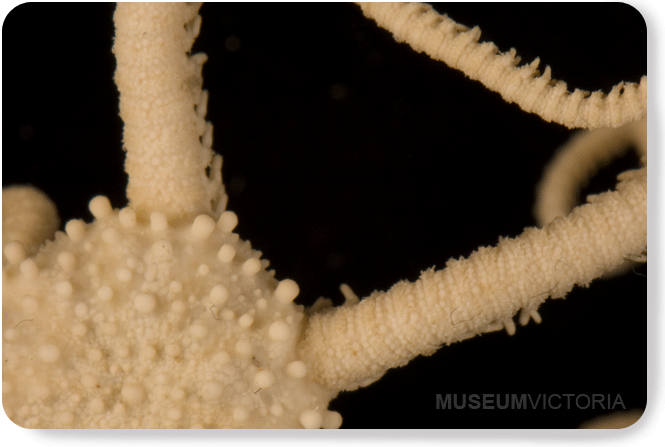
Home -> Species index -> Species description
 More images | Distribution map More images | Distribution map | F 68838, 80929. Family - Gorgonocephalidae. |
Description The disc is flat, 11 mm diameter. The radial shields are covered. The dorsal surface is covered by plates, bearing spines/granules, with a visible diameter of 0.1–0.8 mm, overlapping or touching; primary plates not visible. Disc spines or granules of multiple types, cylindrical, with thorns at the tip. The spines are up to 0.4–1 mm long, and 1–2 times high as wide; sparsely distributed. The second type of spines/granules on the disc are dome-shaped or conical, spines/granules up to 0.1–0.3 mm long, 0.8–1.2 times high as wide, sparsely distributed, one or so per plate/mm. The ventral interradial surface is plated. The oral shields are covered in granules. The adoral shields are covered in granules. Bursal slits extend from the oral shield to the disc margin, not bordered by spines or papillae. The jaw is as wide as long, with one or two (tending toward a cluster), pointed or tapering apical papilla, longer than wide. Oral papillae are present along each jaw angle in a series, pointed. The oral tentacle pore is located inside the jaw, with distal oral papilla similar to other oral papillae. The specimen has five arms, unbranched, moniliform, 5–7 times d.d. Dorsal arm plates not visible, covered by skin, with spines/granules, extending the length of the dorsal arm; bands of hooklets. The second ventral arm plates are not visible, with granules. Ventral arm plates of the first free segments not visible, covered. Tentacle pores along the arm, with no scales. There are 0–2 arm spines on the first ventral segment, 2–3 on the first free segments. The spines are erect, restriced to the ventral surface, subequal, and 1–1.5 times as long as one arm segment, blunt, cylindrical. There are thorns, forming terminal points, on the tip, glassy rough shaft.
Description exported from Delta key and to be finalised when DNA sampling completed. Note species description and image characters may vary slightly in animals of different size within the same species. Cite this publication as: "T O'Hara
(2010). ‘Ophiuroids from deep sea southern Australia. Museum Victoria. Version:
1.0 http://www.museumvictoria.com.au/stars" MUSEUMVICTORIA |